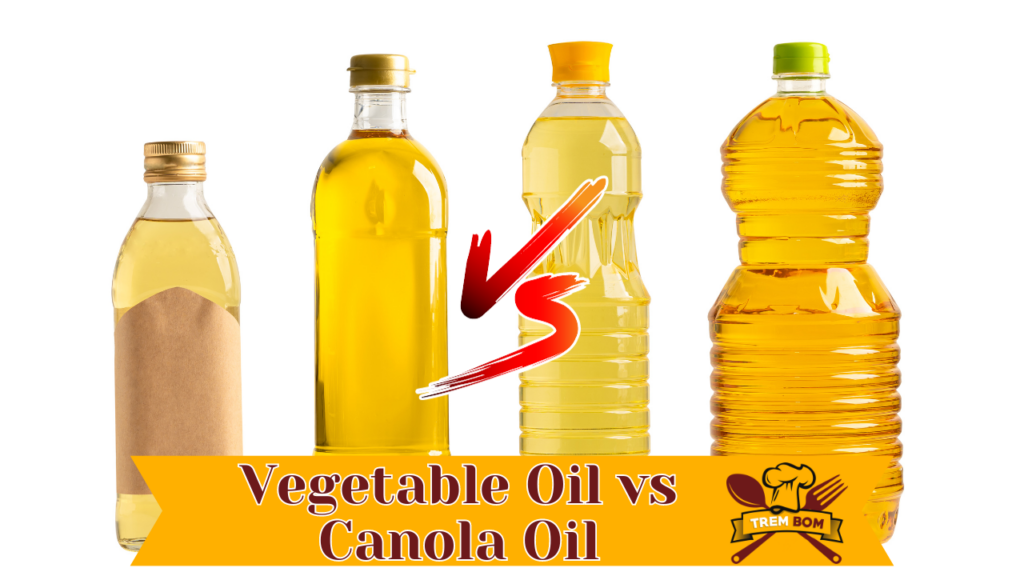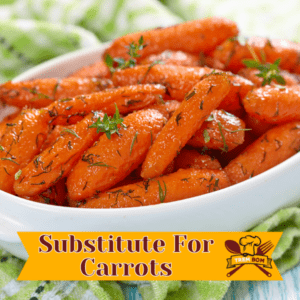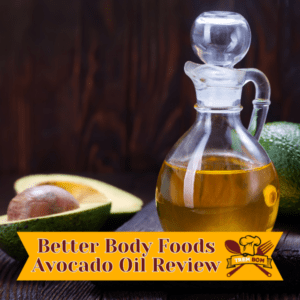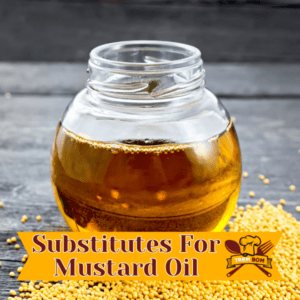
When it comes to cooking oils, the choices can be overwhelming. Two of the most commonly used oils are vegetable oil and canola oil. However, both oils have different nutritional values and properties that make them suitable for different purposes. In this article, we’ll explore the differences between vegetable oil and canola oil, giving you the information you need to make an informed decision on which one is right for you.
Key Takeaways:
- Vegetable oil and canola oil are two of the most commonly used cooking oils.
- Vegetable oil is derived from various plant sources and is known for its versatility and affordability.
- Canola oil is a specific type of vegetable oil made from the seeds of the rapeseed plant and is often recommended for its heart-healthy properties.
- To choose between these oils, you must consider factors such as nutritional preferences, cooking methods, and health considerations.
- Other factors such as smoke point, flavor, and environmental impact are also important to consider.
Understanding Vegetable Oil
Vegetable oil is a versatile and affordable cooking oil that is used in most households. It is extracted from various plant sources such as soybeans, canola, corn, and sunflower, among others.
One of the primary benefits of vegetable oil is its neutral taste, which allows it to blend well with different flavors, making it a great ingredient for baking and cooking savory dishes.
Another advantage of cooking with vegetable oil is its high smoke point, which means that it can withstand high heat without burning or smoking. This makes it an excellent choice for frying or sautéing food.
Benefits of Vegetable Oil
The benefits of vegetable oil are numerous. It is an excellent source of healthy fats, including monounsaturated and polyunsaturated fats, which are essential for the body’s overall health. These healthy fats help control cholesterol levels, promote heart health, and reduce the risk of heart disease.
Vegetable oil also contains Vitamin E, which is a powerful antioxidant that helps protect the body against free radical damage that can lead to chronic illnesses.
Lastly, cooking with vegetable oil helps lower the levels of trans-fats in your diet. Trans-fats are harmful processed fats that can increase the risk of heart disease, obesity, and other health issues.
Unveiling Canola Oil
Canola oil is a type of vegetable oil made from the rapeseed plant, specifically from the seeds of the plant. It was developed in the 1970s through plant breeding to produce a healthier and more versatile oil.
One of the main benefits of canola oil is its nutritional value. It is low in saturated fat and high in unsaturated fat, particularly monounsaturated fatty acids. This makes it a heart-healthy choice for cooking and baking. Canola oil is also a good source of vitamin E and has a high smoke point, making it suitable for high-heat cooking methods like frying.
When cooking with canola oil, it has a neutral flavor profile that does not overpower other ingredients in a dish. This makes it a popular choice for many recipes, from salad dressings to baked goods.
At a molecular level, canola oil has a high level of oleic acid, a type of fatty acid also found in olive oil. This acid is thought to have many health benefits, including reducing inflammation, improving insulin sensitivity, and reducing the risk of heart disease.
However, it is important to note that canola oil is often highly processed, which can reduce its overall nutritional value. It is best to look for cold-pressed or unrefined canola oil for maximum health benefits.
Nutritional Comparison
When it comes to comparing vegetable oil and canola oil, their nutritional value is an essential factor to consider. While both oils are derived from plants, they have distinct differences in their nutrient profiles that can impact their health benefits.
Vegetable oil is generally made from a blend of different plant sources, including soybean, sunflower, and corn oil. It is a rich source of energy and is high in fat, with 120 calories and 14 grams of fat per tablespoon. However, compared to canola oil, vegetable oil has higher levels of saturated fat, with 2.6 grams per tablespoon.
In contrast, canola oil is made from the seeds of the rapeseed plant and has gained popularity for its heart-healthy properties. It has lower saturated fat content than vegetable oil, with only 1 gram per tablespoon. Additionally, it is an excellent source of monounsaturated and polyunsaturated fats, which are beneficial for maintaining healthy cholesterol levels and reducing the risk of heart disease.
Here is a table showing the nutritional comparison between vegetable oil and canola oil:
| Vegetable Oil | Canola Oil | |
|---|---|---|
| Calories per tablespoon | 120 | 120 |
| Total fat per tablespoon | 14g | 14g |
| Saturated fat per tablespoon | 2.6g | 1g |
| Monounsaturated fat per tablespoon | 3.9g | 8g |
| Polyunsaturated fat per tablespoon | 6.6g | 4g |
Overall, canola oil appears to be a healthier option due to its lower levels of saturated fat and higher content of beneficial monounsaturated and polyunsaturated fats. However, it’s important to remember that both oils are high in calories and fat and should be used in moderation as part of a balanced diet.
Smoke Point and Cooking Uses
When it comes to cooking, the smoke point of an oil is a critical factor to consider. It determines the maximum temperature at which the oil can be heated before it starts to burn and produce smoke, leading to a burnt taste and harmful compounds. Both vegetable oil and canola oil have different smoke points, impacting their suitability for various cooking methods.
Frying
For deep frying, canola oil is a better choice than vegetable oil. With its high smoke point and neutral flavor, canola oil can withstand high temperatures without smoking or imparting any unwanted taste to the food. Vegetable oil, on the other hand, has a lower smoke point and may become smoky or bitter when used for deep frying.
Baking
Vegetable oil is a preferred oil for baking, due to its mild flavor and versatility. It works well for light and fluffy baked goods like cakes, cupcakes, and muffins. Canola oil can also be used in baking, but its stronger flavor may not be desirable in certain recipes.
| Smoke Point | Suitability for Frying | Suitability for Baking | |
|---|---|---|---|
| Vegetable Oil | 400-450°F (204-232°C) | Less Ideal | Ideal |
| Canola Oil | 400-475°F (204-246°C) | Ideal | May Impact Flavor |
As you can see, both oils have high smoke points, making them suitable for most cooking needs, especially frying. However, canola oil is more versatile for high-heat cooking because of its higher smoke point. Vegetable oil is a preferred option for baking due to its neutral flavor and texture.
Health Considerations
When it comes to choosing between vegetable oil and canola oil, health considerations often play a crucial role. Both oils contain different types of fats, which can have varying effects on cholesterol levels and heart health.
Cholesterol Levels
Many studies have shown that canola oil can have a positive impact on cholesterol levels. Canola oil contains higher levels of monounsaturated fats and lower levels of saturated fats than vegetable oil. This makes it a healthier choice for individuals looking to maintain healthy cholesterol levels.
Heart Disease
Canola oil has significant heart-healthy properties. According to the American Heart Association, consuming monounsaturated fats, like those in canola oil, can help decrease the risk of heart disease. In contrast, vegetable oil contains higher levels of omega-6 fatty acids, which can be pro-inflammatory and may increase the risk of heart disease.
Healthy Tips
- Use canola oil instead of vegetable oil for salad dressings and dips.
- Incorporate canola oil in your cooking for frying, grilling, baking, and roasting.
- Limit your intake of saturated fats, which are often found in animal products and dairy.
- Try to consume more monounsaturated and polyunsaturated fats, like those found in canola oil and other plant-based oils.
Other Cooking Oils
While vegetable oil and canola oil are the most commonly used cooking oils, there are many other options available. Let’s take a look at some of the other popular oils:
Olive oil
Olive oil is a staple in Mediterranean cuisine and is known for its distinct flavor and health benefits. It’s a great source of monounsaturated fats, which can reduce the risk of heart disease. Olive oil is often used in dressings, marinades, and sautéing vegetables. However, its low smoke point can make it unsuitable for high-temperature cooking methods like frying.
Coconut oil
Coconut oil has gained popularity in recent years for its unique flavor and potential health benefits. It’s high in saturated fats, which can raise cholesterol levels, but some studies suggest that it can improve heart health and boost metabolism. Coconut oil is often used in vegan and gluten-free baking, as well as for frying and sautéing at low to medium heat.
Soybean oil
Soybean oil is a popular vegetable oil that’s often used in processed foods and industrial cooking. It’s a rich source of polyunsaturated fats, which can help lower cholesterol levels and prevent heart disease. Soybean oil has a neutral flavor and can be used for frying, baking, and salad dressings.
Corn oil
Corn oil is another widely used vegetable oil that’s high in polyunsaturated fats and low in saturated fats. It has a mild flavor and is often used for frying, grilling, and baking. However, the refining process used to make corn oil can strip it of certain nutrients and antioxidants.
Avocado oil
Avocado oil is a fairly new addition to the cooking oil market but has quickly gained popularity for its high smoke point and nutritional benefits. It’s rich in monounsaturated fats, which can lower cholesterol levels and reduce the risk of heart disease. Avocado oil is often used for grilling, roasting, and high-heat frying.
Each of these oils has its distinct flavor, smoke point, and nutritional value, making them suitable for different recipes and cooking methods. Experimenting with different oils can add variety and depth to your dishes and provide an opportunity to explore new flavors and textures.
Cooking Tips and Recommendations
Choosing the right cooking oil can make a significant difference in the taste and texture of your dishes. Whether you’re frying, sautéing, or baking, using the appropriate oil ensures optimal flavor and consistency. Here are some tips and recommendations:
High Heat Cooking
When cooking at high temperatures, it’s essential to use oils with a high smoke point to avoid burning and smoke. Vegetable oil and canola oil are both excellent choices for high-heat cooking due to their neutral flavor and high smoke point. However, canola oil has a higher smoke point than vegetable oil, making it a better option for frying and deep-frying.
Frying and Deep Frying
Frying and deep frying require oils capable of withstanding high temperatures for extended periods without breaking down. Canola oil has a smoke point of approximately 400°F, while vegetable oil’s smoke point is around 350°F. When deep-frying, it’s best to use canola oil or any other oil with a smoke point of at least 400°F.
Baking
When baking, neutral-flavored oils work best, as they don’t affect the taste of the baked goods. Canola oil is an excellent option for baking, providing a light and fluffy texture. However, vegetable oil can also be used as a substitute if needed.
Recipes
When following a specific recipe, it’s essential to use the recommended oil to achieve the best results. For example, if a recipe calls for vegetable oil, don’t substitute it with canola oil, as it may affect the flavor and texture of the dish.
Summary
Choosing the right cooking oil depends on the cooking method and the recipe. For high heat cooking, use oils with a high smoke point like canola oil. For baking, use neutral-flavored oils like canola oil. Finally, it’s crucial to follow the recommended oil in any recipe to ensure the desired flavor and texture.
Environmental and Sustainability Factors
The production and consumption of cooking oils have significant environmental and sustainability implications. In this section, we will explore the origins of canola oil, the rapeseed plant, and the efforts to reduce trans-fats and produce healthier, minimally processed oils.
Canola oil is a specific type of vegetable oil made from the seeds of the canola plant. The canola plant was developed in the 1970s from the rapeseed plant through traditional breeding methods. The original rapeseed plant contained high levels of erucic acid and glucosinolates, which are harmful to human and animal consumption. The efforts to develop a new plant with low levels of these compounds led to the creation of the canola plant, which is now widely used for cooking and other food applications.
One of the main benefits of canola oil is its low levels of saturated fats. This makes it a heart-healthy option for consumers. Additionally, the canola plant is one of the most sustainable oil crops, requiring fewer pesticides and fertilizers compared to other plants.
However, there are some concerns about the processing of canola oil and its impact on the environment. In general, the production of vegetable oils involves a significant amount of energy and resources. Additionally, some types of vegetable oils, including canola oil, are extracted using solvents, which can release harmful chemicals into the environment.
To address these concerns, there is a growing trend towards producing minimally processed, cold-pressed oils. These oils are extracted without the use of solvents or high heat, resulting in a pure, nutrient-rich product. Some examples of minimally processed oils include avocado oil, coconut oil, and olive oil.
Trans-fats and Processed Oils
Another issue related to the production and consumption of cooking oils is the presence of trans-fats. Trans-fats are a type of unsaturated fat that can increase the risk of heart disease and other health problems. They are often found in processed foods and cooking oils that have been partially hydrogenated.
Fortunately, many countries have taken steps to reduce the use of trans-fats in food products. In the United States, the Food and Drug Administration (FDA) has issued a ban on the use of trans-fats in food products. In Canada, trans-fats must be listed on food labels, and there are limits on the amount that can be used in food products.
Consumers can also reduce their intake of trans-fats by choosing minimally processed oils and avoiding processed foods. By making these small changes, we can promote a healthier and more sustainable food system.
Conclusion
After exploring the differences between vegetable oil and canola oil, it’s clear that both oils have their advantages and disadvantages. It ultimately comes down to personal preference and cooking needs.
If you’re interested in a versatile, affordable oil that can be used for a variety of dishes, then vegetable oil is a great option. It has a high smoke point, neutral flavor, and is readily available in most grocery stores.
However, if you’re looking for an oil with heart-healthy properties that can help you lower your cholesterol levels, then canola oil is the way to go. It has a lower level of saturated fats and a higher level of unsaturated fats, making it a better choice for your overall health.
Final Thoughts
While vegetable oil and canola oil are the most commonly used cooking oils, it’s essential to consider other options like olive oil, coconut oil, soybean oil, and avocado oil. Each oil has a unique flavor and nutritional profile that can enhance your dishes in different ways.
When choosing a cooking oil, consider your health concerns, the cooking method, and the recipe’s flavor profile. By doing so, you can make an informed decision that will not only benefit your health but also optimize your culinary experience.
So, whether you’re frying, baking, or sautéing, choose the right oil for your cooking needs and enjoy delicious meals that are both nutritious and flavorful.
FAQ
What is the difference between vegetable oil and canola oil?
Vegetable oil is a generic term for any oil derived from plant sources, while canola oil is a specific type of vegetable oil made from the seeds of the rapeseed plant.
What are the benefits of using vegetable oil?
Vegetable oil is versatile and affordable, making it a popular choice for cooking. It can be used in various recipes and provides a neutral flavor.
Why is canola oil recommended for its heart-healthy properties?
Canola oil is low in saturated fat and contains high levels of heart-healthy monounsaturated fats. It also has a favorable omega-3 to omega-6 fatty acid ratio.
How do the nutritional profiles of vegetable oil and canola oil compare?
Vegetable oil and canola oil have similar fat content, but canola oil has a lower level of saturated fat and a higher level of monounsaturated fat. Both oils contain vitamin E and other nutrients.
What are the ideal cooking uses for vegetable oil and canola oil?
Vegetable oil and canola oil have high smoke points, making them suitable for frying, baking, and other high-heat cooking methods. They have neutral flavors that complement a wide range of dishes.
How do vegetable oil and canola oil impact cholesterol levels and heart health?
Vegetable oil and canola oil, when used as part of a balanced diet, can help lower LDL cholesterol levels and reduce the risk of heart disease. However, moderation is key, as they are still calorie-dense.
What other cooking oils can be considered?
Apart from vegetable oil and canola oil, other popular cooking oils include olive oil, coconut oil, soybean oil, corn oil, and avocado oil. Each oil has its own unique flavor and characteristics.
Any cooking tips for using vegetable oil and canola oil?
When frying, choose an oil with a high smoke point like vegetable oil or canola oil. For baking, consider using canola oil for its light flavor. Experiment with different oils to find your preferred taste.
Are there any environmental and sustainability factors to consider with these oils?
Canola oil is derived from the rapeseed plant and efforts have been made to reduce trans-fats and create healthier, minimally processed oils. Consider choosing oils produced with sustainable practices.
What should I consider when deciding between vegetable oil and canola oil?
When choosing between vegetable oil and canola oil, consider your nutritional preferences, cooking methods, and health considerations. Both oils have their own unique qualities that make them suitable for different culinary needs.





